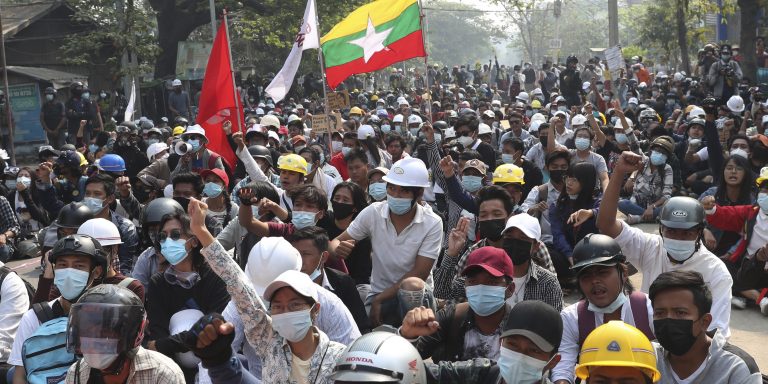INTELBRIEF
June 11, 2021
IntelBrief: Diplomacy Stalls Amidst Spiraling Violence in Myanmar Since the Coup

Bottom Line Up Front
- Four months after the coup, Myanmar still faces myriad challenges, with at least 857 protesters killed by government forces.
- Deposed government officials have formed a shadow government, while civilian leader Aung San Suu Kyi remains under arrest and faces additional charges.
- Association of Southeast Asian Nations foreign ministers met with a junta representative on Monday, noting a lack of progress on the agreed upon five-point plan.
- Political debates in the UN Security Council and General Assembly have stalled momentum in the responses to the crisis and make an arms embargo unlikely.
Four months on, Myanmar still faces the political, security, and human rights challenges brought on by the February 1 military coup, as civilian protests persist. Myanmar is facing a significant escalation in violence, with increasing challenges to Myanmar’s military, known as the Tatmadaw, emanating from ethnic insurgencies and a resolute civilian opposition. At least 857 protesters have been killed by government forces and over 4,700 detained, according to a local human rights group, Assistance Association for Political Prisoners. The UN Refugee Agency (UNHCR) estimates that 175,000 people have been internally displaced since the coup began. Myanmar’s Ambassador to the UN, U Kyaw Moe Tun, who bravely critiqued the military coup in the UN General Assembly in February, remains recognized by the UN as the legitimate representative of Myanmar. Deposed civilian government officials have formed a shadow government, the National Unity Government (NUG), while civilian leader Aung San Suu Kyi remains under arrest. On June 10, state-controlled media reported an accusation by Myanmar’s Anti-Corruption Commission that Suu Kyi accepted bribes and manipulated her authority for personal gain, allegations which her lawyers deny and for which no evidence has been presented. Nonetheless, a conviction for such crimes could disqualify her from candidacy in a next election.
Association of Southeast Asian Nations (ASEAN) foreign ministers met with a junta representative in China on Monday. This followed on a five-point plan agreed upon at an ASEAN summit back in April, which had included calling for a cessation of violence, dialogue between all parties, and mediation by ASEAN. Myanmar’s junta leader Min Aung Hlaing said afterward that he would consider the proposal “after stabilizing the country.” In this week’s meeting, ASEAN leaders expressed disappointment at the lack of progress made by the junta to date. However, a UN General Assembly vote on a resolution on Myanmar has also been indefinitely postponed, tied to many ASEAN member states’ discontent with language on a potential arms embargo. In contrast to sanctions and definitive remarks from U.S. and EU leadership, China has continued to cooperate with the junta, as expected. The Tatmadaw leadership particularly needs the political legitimacy provided by China’s recognition, given the challenge from the NUG for international attention. In the UN Security Council, China has systematically impeded efforts to sanction Myanmar, although backing more modest statements that critique violence against civilians. Instead, as another chess piece in a broader game of great power competition, China has pursued leadership in facilitating diplomacy with ASEAN to find a path forward in Myanmar.
The United Nations estimates that 100,000 people have been recently displaced by fighting in Myanmar’s Kayah state, including indiscriminate bombing and artillery fire by the government forces. Such violence has escalated since late May, when fighting broke out between the government forces and the Karenni People’s Defense Force (KPDF). UN special rapporteur for Myanmar Tom Andrews said in a statement Tuesday, “Mass deaths from starvation, disease, and exposure, on a scale we have not yet seen since the February 1 coup, could occur in Kayah State absent immediate action.” In addition to his calls to the junta for humanitarian access to the area and a cessation of attacks against civilians, Andrews called on the international community to “cut off access to the resources the junta needs to continue these brutal attacks on the people of Myanmar,” including via an arms embargo. The sense of urgency in his remarks was palpable.
Interestingly, last week, the NUG released a position paper about ethnic minorities, with great potential significance for the majority Muslim Rohingya population currently persecuted and consistently denied citizenship. The document indicates that “all ethnic groups who are native to the Union have full enjoyment of individual rights held by individual people and collective rights held by ethnic groups.” If implemented in a future with their reinstated political leadership, such a policy would ensure citizenship for the Rohingya; however, NUG leaders’ commentary since has indicated that the specific impacts for the Rohingya community are yet to be discussed and determined. Despite the lack of clarity in their intention to see such policies through should they regain political authority, the rhetoric marks a significant shift. U.S. Secretary of State Antony Blinken tweeted that the NUG statement is "an important signal to all those working for an inclusive, democratic future."
Michelle Bachelet, UN High Commissioner for Human Rights, has previously warned that the crisis in Myanmar is “heading toward a full-blown conflict” – even drawing comparisons to the start of the Syrian conflict – highlighting the need to stem the flow of weapons and finances to the junta to prevent further spiraling of the violence. Nonetheless, the position of states like China and the ability to marshal support and impede progress in the Security Council has stalled momentum in response to the crisis. As ASEAN continues to lead on mediation, their stance of non-interference, concurrent with the intensification of violence, does not indicate significant leverage to compel change by Myanmar’s military leadership.